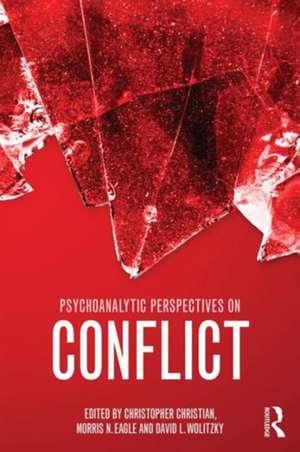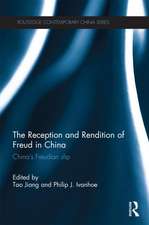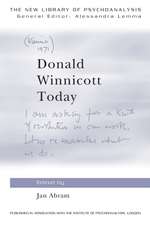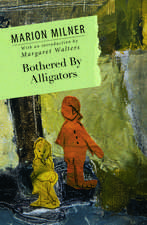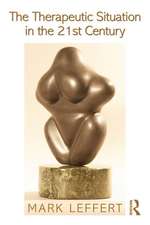Psychoanalytic Perspectives on Conflict: Psychological Issues
Editat de Christopher Christian, Morris Eagle, David L Wolitzkyen Limba Engleză Paperback – 31 ian 2017
In Psychoanalytic Perspectives on Conflict, a highly distinguished group of authors outline the main contemporary theoretical understandings of the role of conflict in psychoanalysis, and what this can teach us for everyday psychoanalytic practice. The book fills a gap in psychoanalytic thinking as to the essence of conflict and therapeutic action, at a time when many theorists are re-conceptualizing conflict in relation to aspects of mental life as an essential component across theories.
Psychoanalytic Perspectives on Conflict will be of interest to psychologists, psychoanalysts, social workers, and other students and professionals involved in the study and practice of psychoanalysis, psychotherapy, cognitive science and neuroscience.
| Toate formatele și edițiile | Preț | Express |
|---|---|---|
| Paperback (1) | 460.81 lei 43-57 zile | |
| Taylor & Francis – 31 ian 2017 | 460.81 lei 43-57 zile | |
| Hardback (1) | 1063.00 lei 43-57 zile | |
| Taylor & Francis – 25 ian 2017 | 1063.00 lei 43-57 zile |
Din seria Psychological Issues
- 5%
 Preț: 273.96 lei
Preț: 273.96 lei - 5%
 Preț: 272.53 lei
Preț: 272.53 lei - 5%
 Preț: 240.90 lei
Preț: 240.90 lei - 5%
 Preț: 239.51 lei
Preț: 239.51 lei - 5%
 Preț: 233.05 lei
Preț: 233.05 lei - 5%
 Preț: 253.45 lei
Preț: 253.45 lei -
 Preț: 504.76 lei
Preț: 504.76 lei - 5%
 Preț: 476.06 lei
Preț: 476.06 lei -
 Preț: 463.17 lei
Preț: 463.17 lei -
 Preț: 513.21 lei
Preț: 513.21 lei - 5%
 Preț: 427.92 lei
Preț: 427.92 lei - 17%
 Preț: 279.23 lei
Preț: 279.23 lei -
 Preț: 392.70 lei
Preț: 392.70 lei -
 Preț: 395.93 lei
Preț: 395.93 lei - 5%
 Preț: 416.91 lei
Preț: 416.91 lei - 5%
 Preț: 425.63 lei
Preț: 425.63 lei - 5%
 Preț: 353.64 lei
Preț: 353.64 lei - 5%
 Preț: 358.23 lei
Preț: 358.23 lei - 5%
 Preț: 302.79 lei
Preț: 302.79 lei - 5%
 Preț: 234.09 lei
Preț: 234.09 lei -
 Preț: 315.02 lei
Preț: 315.02 lei
Preț: 460.81 lei
Preț vechi: 485.07 lei
-5% Nou
Puncte Express: 691
Preț estimativ în valută:
88.17€ • 92.31$ • 72.96£
88.17€ • 92.31$ • 72.96£
Carte tipărită la comandă
Livrare economică 07-21 aprilie
Preluare comenzi: 021 569.72.76
Specificații
ISBN-13: 9781138795211
ISBN-10: 1138795216
Pagini: 348
Ilustrații: 3
Dimensiuni: 156 x 234 x 27 mm
Greutate: 0.52 kg
Ediția:1
Editura: Taylor & Francis
Colecția Routledge
Seria Psychological Issues
Locul publicării:Oxford, United Kingdom
ISBN-10: 1138795216
Pagini: 348
Ilustrații: 3
Dimensiuni: 156 x 234 x 27 mm
Greutate: 0.52 kg
Ediția:1
Editura: Taylor & Francis
Colecția Routledge
Seria Psychological Issues
Locul publicării:Oxford, United Kingdom
Public țintă
Postgraduate and ProfessionalCuprins
About the authors Acknowledgements Introduction 1. Inner Conflict in Freudian Theory 2. The Evolution of Modern Conflict Theory 3. The Fate of Conflict and the Impoverishment of Our Clinical Methods 4. Conflict from the Perspective of Free Association 5. Inner Conflict in Fairbairn’s Theory of Endopyschic Structure 6. Kleinian and Post-Kleinian Perspectives on Conflict 7. Analytic Trust, Transference and the Importance of Conflict 8. Emergence of Conflict During the Development of Self: A Relational Self Psychology Perspective 9.The Phenomenological Contextualism of Conflict: An Intersubjective Perspective 10. Conflict and Change: Producer, Trigger, Sign, Outcome 11. The Dialectic of Desire: a view of intrapsychic conflict in the work of Jacques Lacan 12. Forces at Play in Psychical Conflict 13. On Conflict in Attachment Theory and Research 14. Addressing Defenses against Painful Emotions: Modern Conflict Theory in Psychotherapeutic Approaches with Children 15. Implicit Attitudes, Unconscious Fantasy, and Conflict 16. Neural Basis of Intrapsychic and Unconscious Conflict and Repetition Compulsion References
Notă biografică
Christopher Christian, Ph.D. is Assistant Professor at the New School for Social Research, Director at the New School Beth Israel Center for Clinical Training and Research, member of IPTAR and Faculty at the Institute for Psychoanalytic Education, NYU Medical Center. He is co- editor of The Second Century of Psychoanalysis: Evolving Perspectives on Therapeutic Action and is on the editorial board of the Journal of the American Psychoanalytic Association and Psychoanalytic Psychology.
Morris N. Eagle, Ph.D. is Distinguished Educator-in Residence at California Lutheran University and is in part-time private practice. He is the author of From Classical to Contemporary Psychoanalysis: A Critique and Integrationand many journal articles. Morris is former President of the Division of Psychoanalysis of the American Psychological Association and recipient of the Sigourney Award, 2009.
David L. Wolitzky, Ph.D. is a faculty member in the Department of Psychology, New York University, where he held the position of Director of Clinical Training for the Ph.D. Program in Clinical Psychology. He is a graduate of the New York Psychoanalytic Institute and is a Supervisor in the New York University Postdoctoral Program in Psychoanalysis and Psychotherapy. David is the Editor of the Psychological Issues book series.
Morris N. Eagle, Ph.D. is Distinguished Educator-in Residence at California Lutheran University and is in part-time private practice. He is the author of From Classical to Contemporary Psychoanalysis: A Critique and Integrationand many journal articles. Morris is former President of the Division of Psychoanalysis of the American Psychological Association and recipient of the Sigourney Award, 2009.
David L. Wolitzky, Ph.D. is a faculty member in the Department of Psychology, New York University, where he held the position of Director of Clinical Training for the Ph.D. Program in Clinical Psychology. He is a graduate of the New York Psychoanalytic Institute and is a Supervisor in the New York University Postdoctoral Program in Psychoanalysis and Psychotherapy. David is the Editor of the Psychological Issues book series.
Recenzii
"In this major contribution to the field, the editors have taken the fundamental psychoanalytic premise of conflict as a central organizing construct for purposes of comparing and contrasting a broad array of psychoanalytic perspectives on personality development, psychopathology and therapeutic action. Their approach provides a kaleidoscopic perspective that illuminates both intriguing connections and subtle difference among diverse psychoanalytic approaches. Bringing together outstanding contributions from some of the leading figures in the field, the editors have produced a superb volume that is essential reading for anyone interested in the future of psychoanalysis." - Jeremy D. Safran, Ph.D., Chair & Professor of Psychology, The New School for Social Research
"Psychoanalytic approaches differ in the way they deal with conflict-- with some believing that conflict can be resolved and others rejecting such a prospect. Indeed, no psychoanalytic approach fails to conceptualize conflict, and one can reasonably conclude that conflict is fundamental to a psychoanalytic way of thinking about human beings and about treatment. Yet, it is surprising to realize that conflict has not been the subject of more focus and reflection. Until now, Christian, Eagle and Wolitzky have done an extraordinary service to the field by collecting essays from different psychoanalytic orientations-- Contemporary Freudian, Object Relations, Self Psychology, Relational, Lacanian and Attachment-- written by some of the most original thinkers in the field. Treatment issues are central, but the book also covers neurobiological and developmental issues as well. For psychoanalysts who long for dialogue across psychoanalytic orientations, this book is exemplary, and deserves a wide audience." - Elliot Jurist, Professor of Psychology and Philosophy, the Graduate Center and the City College of New York, the City University of New York, and Editor of Psychoanalytic Psychology
"In this major contribution to the field, the editors have taken the fundamental psychoanalytic premise of conflict as a central organizing construct for purposes of comparing and contrasting a broad array of psychoanalytic perspectives on personality development, psychopathology and therapeutic action. Their approach provides a kaleidoscopic perspective that illuminates both intriguing connections and subtle difference among diverse psychoanalytic approaches. Bringing together outstanding contributions from some of the leading figures in the field, the editors have produced a superb volume that is essential reading for anyone interested in the future of psychoanalysis."
- Jeremy D. Safran, Ph.D., Chair & Professor of Psychology, The New School for Social Research
"Psychoanalytic approaches differ in the way they deal with conflict-- with some believing that conflict can be resolved and others rejecting such a prospect. Indeed, no psychoanalytic approach fails to conceptualize conflict, and one can reasonably conclude that conflict is fundamental to a psychoanalytic way of thinking about human beings and about treatment. Yet, it is surprising to realize that conflict has not been the subject of more focus and reflection. Until now, Christian, Eagle and Wolitzky have done an extraordinary service to the field by collecting essays from different psychoanalytic orientations-- Contemporary Freudian, Object Relations, Self Psychology, Relational, Lacanian and Attachment-- written by some of the most original thinkers in the field. Treatment issues are central, but the book also covers neurobiological and developmental issues as well. For psychoanalysts who long for dialogue across psychoanalytic orientations, this book is exemplary, and deserves a wide audience."
- Elliot Jurist, Professor of Psychology and Philosophy, the Graduate Center and the City College of New York, the City University of New York, and Editor of Psychoanalytic Psychology
"There is no question that the edited volume, Psychoanalytic Perspectives on Conflict, is both a noble and necessary endeavor. By articulating different perspectives around a single, central concept, it touches every essential controversy that has divided the different schools of psychoanalysis.
Collected together, each of the eminent authors explains how conflict works, or how it is defined in their particular corner of the psychoanalytic universe. A terrific, scholarly beginning, clearly articulating theoretical stances so that the difference can be seen"
-Lissa Weinstein, Ph.D., Psychoanalytic Psychology
"Psychoanalytic approaches differ in the way they deal with conflict-- with some believing that conflict can be resolved and others rejecting such a prospect. Indeed, no psychoanalytic approach fails to conceptualize conflict, and one can reasonably conclude that conflict is fundamental to a psychoanalytic way of thinking about human beings and about treatment. Yet, it is surprising to realize that conflict has not been the subject of more focus and reflection. Until now, Christian, Eagle and Wolitzky have done an extraordinary service to the field by collecting essays from different psychoanalytic orientations-- Contemporary Freudian, Object Relations, Self Psychology, Relational, Lacanian and Attachment-- written by some of the most original thinkers in the field. Treatment issues are central, but the book also covers neurobiological and developmental issues as well. For psychoanalysts who long for dialogue across psychoanalytic orientations, this book is exemplary, and deserves a wide audience." - Elliot Jurist, Professor of Psychology and Philosophy, the Graduate Center and the City College of New York, the City University of New York, and Editor of Psychoanalytic Psychology
"In this major contribution to the field, the editors have taken the fundamental psychoanalytic premise of conflict as a central organizing construct for purposes of comparing and contrasting a broad array of psychoanalytic perspectives on personality development, psychopathology and therapeutic action. Their approach provides a kaleidoscopic perspective that illuminates both intriguing connections and subtle difference among diverse psychoanalytic approaches. Bringing together outstanding contributions from some of the leading figures in the field, the editors have produced a superb volume that is essential reading for anyone interested in the future of psychoanalysis."
- Jeremy D. Safran, Ph.D., Chair & Professor of Psychology, The New School for Social Research
"Psychoanalytic approaches differ in the way they deal with conflict-- with some believing that conflict can be resolved and others rejecting such a prospect. Indeed, no psychoanalytic approach fails to conceptualize conflict, and one can reasonably conclude that conflict is fundamental to a psychoanalytic way of thinking about human beings and about treatment. Yet, it is surprising to realize that conflict has not been the subject of more focus and reflection. Until now, Christian, Eagle and Wolitzky have done an extraordinary service to the field by collecting essays from different psychoanalytic orientations-- Contemporary Freudian, Object Relations, Self Psychology, Relational, Lacanian and Attachment-- written by some of the most original thinkers in the field. Treatment issues are central, but the book also covers neurobiological and developmental issues as well. For psychoanalysts who long for dialogue across psychoanalytic orientations, this book is exemplary, and deserves a wide audience."
- Elliot Jurist, Professor of Psychology and Philosophy, the Graduate Center and the City College of New York, the City University of New York, and Editor of Psychoanalytic Psychology
"There is no question that the edited volume, Psychoanalytic Perspectives on Conflict, is both a noble and necessary endeavor. By articulating different perspectives around a single, central concept, it touches every essential controversy that has divided the different schools of psychoanalysis.
Collected together, each of the eminent authors explains how conflict works, or how it is defined in their particular corner of the psychoanalytic universe. A terrific, scholarly beginning, clearly articulating theoretical stances so that the difference can be seen"
-Lissa Weinstein, Ph.D., Psychoanalytic Psychology
Descriere
In Psychoanalytic Perspectives on Conflict, a highly distinguished group of authors outline the main contemporary theoretical understandings of the role of conflict in psychoanalysis, and what this can teach us for everyday psychoanalytic practice.
